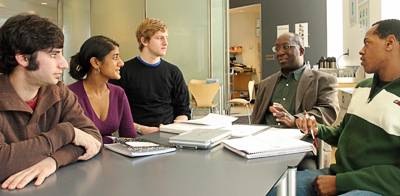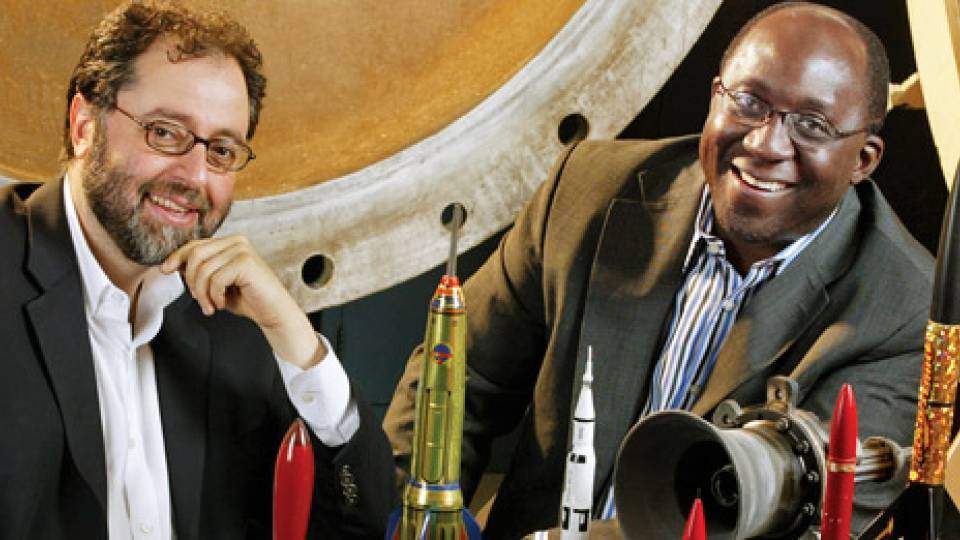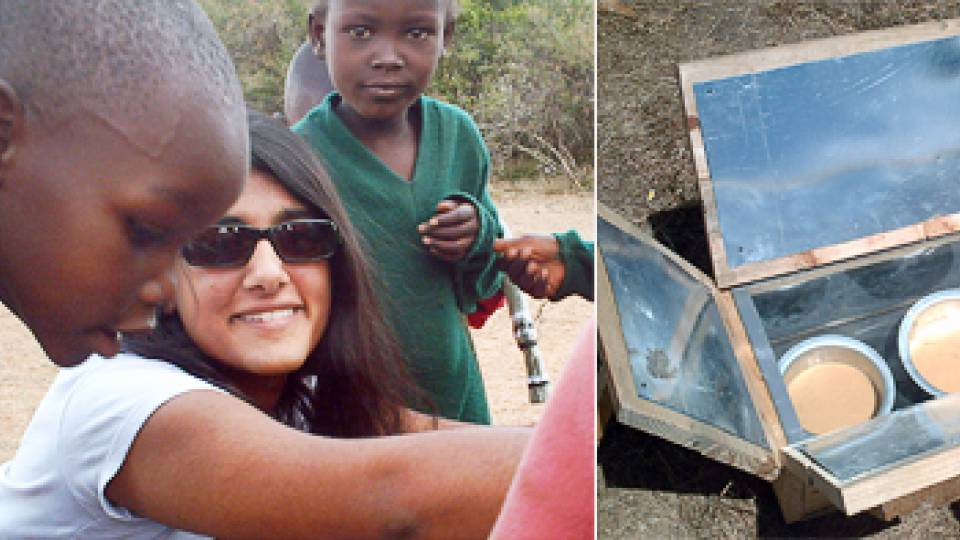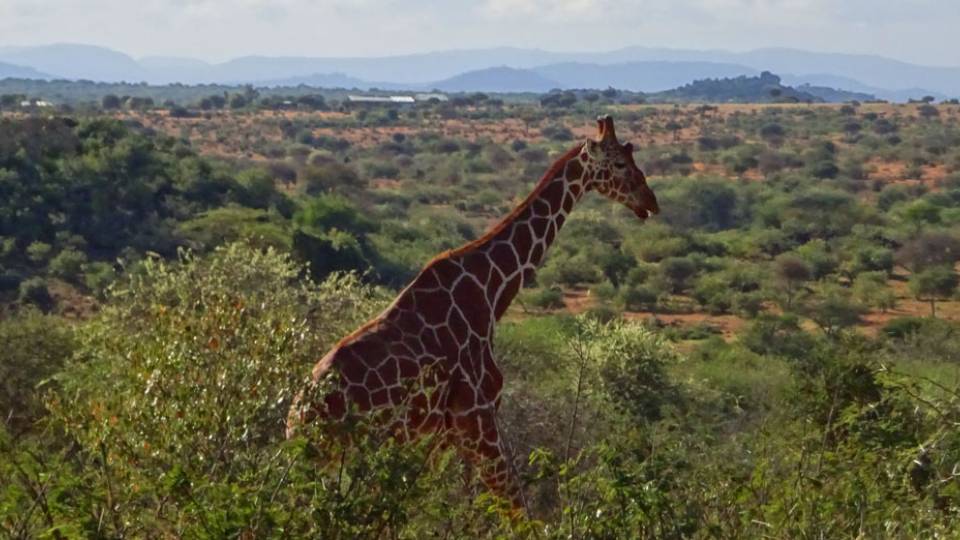From the Feb. 26, 2007, Princeton Weekly Bulletin(Link is external)
From the beginning, Winston Oluwole Soboyejo(Link is external) has been of two worlds — the developing and the developed.
Born in Palo Alto, Calif., on the day Sir Winston Churchill died, Soboyejo’s first name is after the charismatic former prime minister of the United Kingdom. But he has always gone by Wole, the abbreviated form of his middle name, a traditional name of the Yoruba tribe of western Nigeria. It was there that Soboyejo lived from age 1 to 13, headed toward a career as one of the world’s leading materials scientists.
“I was inspired by growing up in a developing country, by seeing the problems people have and coming up with ways to tackle them,” said Soboyejo, a professor of mechanical and aerospace engineering.
His outlook is global not only in terms of geography, but in the challenges he addresses and the way he approaches them. Soboyejo’s ongoing, and simultaneous, research projects address problems in the areas of human health, sustainable energy and nanotechnology, to name just a few. Many of these initiatives combine the talent and expertise of scientists throughout the world through the U.S./Africa Materials Institute (USAMI)(Link is external), which Soboyejo founded and directs.
When he is not abroad establishing collaborations and conducting research, Soboyejo can often be found in the EQuad Café, deep in conversation with students. He is known for his ability to imbue his protégés not only with engineering skills, but with the desire to use them to improve lives throughout the world. Based on student evaluations, he was named to the engineering school’s Commendation List for Outstanding Teaching for the spring 2006 semester.
“Professor Soboyejo seems to have unlimited energy and enthusiasm for the progress of materials research and education in the developing world,” said Himanshu Jain, a USAMI member and professor of engineering at Lehigh University. Jain and Soboyejo collaborate on a project that involves researchers from five universities in four countries (located on three continents) to develop a glass that can be used as a scaffold for regrowing injured bone.
“I am always amazed at his ability to think at the continental level and at the atomic level at the same time,” Jain said. “There are few leaders who have insight into the international issues and detailed scientific understanding of their research at the same time.”

A lifetime of interest
Winston Oluwole Soboyejo started young.
As a child, he carefully watched his father, a Yoruba chief named Alfred Soboyejo, use the tools of mechanical engineering to advance Nigerian development. Then an engineering professor at the University of Lagos and the head of an engineering consulting company, Alfred Soboyejo recognized in his son the signs of a budding engineer from early on.
“We’d buy him lots of toys even though he would ruin them within two days, taking them to pieces to figure out how they worked,” recalled the elder Soboyejo, who left Nigeria in 1995 to join the engineering faculty at Ohio State University. “By age 5, he would come to my office and use his pen and pencil to scratch on my paper. But I never discouraged him — I just bought him his own small table to set next to mine.” From 1966 to 1967, his father spent a year away from 2-year-old Wole as a postdoctoral researcher at Princeton, working with Cemal Eringen, now a professor emeritus of civil engineering and operations research.
At age 13, Wole left Nigeria to attend Kelly College, an English boarding school. His teachers, unconvinced of the merits of engineering, encouraged him to go into law or business. Despite their protests, he went on to earn a B.Sc. in engineering at King’s College of London University, at the time planning to return to Nigeria.
“I may have been naïve, but I was quite convinced that engineering really could make a difference in the world,” Soboyejo said. “You have to pursue your own dreams — you shouldn’t do things because other people think you should.”
It was in his final year at King’s College that he was introduced to and captivated by the field of materials science and its quest to design new substances with useful properties. His newfound fascination led him not back to Nigeria, but to Churchill College of Cambridge University, where he earned a Ph.D. in the subject in 1988. He was only 23 years old.
After four years as a research scientist in industry, he joined the faculty at Ohio State University in 1992. He later spent a year as a visiting professor at the Massachusetts Institute of Technology before joining the Princeton faculty in 1999.
Materials for a better world
A longtime dream of Soboyejo’s came true in 2003 with the establishment of the USAMI, one of six international materials institutes supported by the National Science Foundation.
“To really engage global development, Africa is the last untapped frontier,” Soboyejo said. “Talented scientists are in many cases falling behind because they haven’t had access to facilities and resources they need.”
The USAMI takes a multi-pronged approach to this challenge. In addition to bringing African scientists to the United States to conduct research in affiliated laboratories, the institute helps establish new research laboratories in Africa. The collaboration was instrumental in creating an organic electronics laboratory in Nigeria, which in turn spurred a national nanotechnology initiative backed by the Nigerian government.
The collaborations supported by the USAMI promise to benefit people throughout the world. Already, institute researchers, including Soboyejo and others at Princeton, have created submicroscopic particles, just a few billionths of a meter wide, that could vastly improve the detection and treatment of breast and prostate cancer.
Designed to selectively attach to sites on tumor cells, the particles may one day allow doctors to detect submillimeter-sized tumors with existing medical imaging technologies. Currently, magnetic resonance imaging techniques can detect tumors only larger than a few millimeters, which already contain hundreds of millions of cancer cells. The team also has incorporated anticancer pharmaceuticals into the particles to deliver the potent chemicals specifically to cancer cells. The research team includes Princeton chemical engineering professors Robert Prud’homme, Athanassios Panagiotopoulos and Yannis Kevrekidis.
The institute’s focus on health extends beyond the human body to the well-being of ecosystems and the environment. Conscious of the fact that technological advancement often comes at a price to the environment in many developing nations, Soboyejo is leading efforts through the USAMI to develop sustainable materials for affordable housing and energy-efficient technologies. Based on the work, construction of a photovoltaics laboratory for the production of solar panels is now under way in Nigeria.
In addition to heading the USAMI, Soboyejo chairs the African Science Committee of the African Institute of Science and Technology, part of the Delaware-based Nelson Mandela Institution. The organization seeks to establish four institutes of science and technology in Africa that are modeled on the elite Indian Institutes of Technology.
Sharing his vision with students
Soboyejo is devout in his belief in the importance of education for the countless students he has taught and inspired throughout the world. Over the years, he became an avid proponent of the education to be found outside the classroom walls.
“There is much to be learned by U.S. students who engage in cultural development experiences that broaden their thinking,” he said. “When they participate in exchange programs and research opportunities, they don’t just go to give. They go to receive some understanding, and they come back better informed about the world.”
Randy Bly, a 2004 Princeton graduate, is carrying that broadened understanding forward as a student at the Stritch School of Medicine at Loyola University in Chicago. While at Princeton, Bly took every course offered by Soboyejo and worked with him on his senior thesis project to improve bonding between bone and titanium implants. After graduating, Bly spent the summer in Alexandria, Egypt, to continue the work with renowned tissue engineer Mona Marei, a member of the USAMI. He has since returned to Egypt to conduct research during a break from his medical studies.
“Living in Egypt was an invaluable experience,” Bly said. He credits his time abroad, and Soboyejo’s influence, with his goal to work internationally as a physician. “Professor Soboyejo has a unique optimism and vision that inspires students.”
Soboyejo shares this vision in courses he teaches at Princeton and in Africa, including “Introduction to Bioengineering and Medical Devices,” held on the Princeton campus, and “Special Topics in Mechanical and Aerospace Engineering: Global Technology,” taught as part of the University’s semester in Kenya program at the Mpala Research Centre.
“Wole sees the whole picture; he sees first and farther than the average person and takes steps to actualize these visions,” said Bernard Aduda, a professor of physics at the University of Nairobi, who co-teaches the global technology course. “This makes him a great but very humble scientific and community leader.”
Daniel Rubenstein, chair of Princeton’s ecology and evolutionary biology department, said Soboyejo’s enthusiasm is contagious and his insights inspiring. Rubenstein conducts research and teaches at Mpala and is currently collaborating with Soboyejo on a water purification project.
“Wole’s ability to teach students about the design, the fabrication and the utility of appropriate technology, and what cultural barriers need to be overcome for the technology to work effectively and improve lifestyles, is simply amazing,” said Rubenstein, who also is director of the University’s Program in African Studies.
Changing lives
Even students who haven’t experienced Soboyejo in the classroom have internalized his passion for using engineering to conquer global problems.
Daniel Cohen, now a junior majoring in mechanical and aerospace engineering, was a freshman when he initially heard Soboyejo talk about global development. “This was the first time I’d encountered Professor Soboyejo, and his charisma and unparalleled idealism influenced me to seek him out and see what I could do.”
The presentation had a similar effect on fellow juniors Julianne Davis, Ishani Sud and Patricia Li who, along with Cohen, were inspired to create the Global Development Network. Now an officially recognized student group, the organization promotes sustainable technologies in developing nations throughout the world. In January, Sud presented one of the group’s projects — ceramic water filters constructed from simple materials, including mud and straw — at a conference in Nigeria.
Senior Thomas Woodson, an electrical engineering major, also presented at the conference, describing research done with Soboyejo to improve the efficiency of solar panels.
“Professor Soboyejo has greatly altered my future plans,” said Woodson, who intends to work with Princeton in Africa, Princeton in Asia or the Peace Corps next year. “He has opened my eyes to the world of sustained development technology and has shown me how my engineering and research skills can help other countries become technologically savvy.”
That is just the lesson Soboyejo strives to teach.
“Science and engineering really matter to the world — they’re not just something abstract you learn to complete problem sets,” Soboyejo said.






